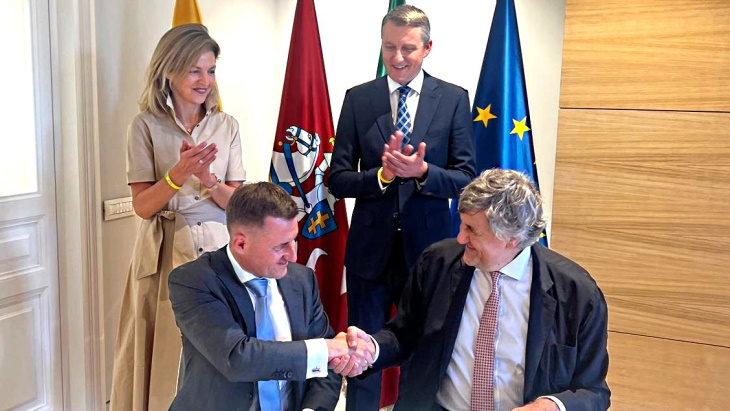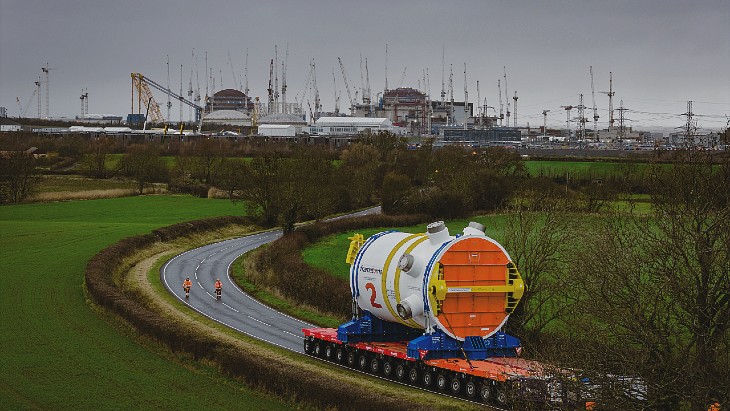Through a memorandum of understanding signed in Rome on 9 July by Newcleo founder and CEO Stefano Buono and Ignalina NPP CEO Linas Baužys, the partners will consider the potential role of Newcleo's small modular lead-cooled fast reactor in providing economically viable, safe, reliable, and efficient energy solutions in Lithuania and for the safe handling of the country's used nuclear fuel.
The MoU - signed in the presence of the Lithuanian Energy Minister Žygimantas Vaičiūnas - paves the way for feasibility studies to be carried out on areas including: siting evaluations; reprocessing of Lithuania's stocks of used nuclear fuel; potential industrial applications in connection to hydrogen and ammonia production; and the creation of local nuclear supply chains. The project also aims to evaluate the feasibility of integrating small modular reactors (SMRs), such as Newcleo's design, into an energy system prioritising renewables – the aim being to enhance grid stability while contributing to the broader objective of decarbonisation.
Last month, Newcleo and Slovak state-owned radioactive waste management company JAVYS signed a joint venture shareholder agreement, paving the way toward the construction of up to four Newcleo lead-cooled fast reactors at the Bohunice site. The units would be powered with mixed uranium/plutonium oxide (MOX) fuel fabricated from existing Slovakian used nuclear fuel extracted from the country's current reactor fleet.
Newcleo said it is "seeking to expand this operating model to other territories with existing nuclear operations or legacy spent fuel, which include many Eastern European countries, as a way of sustainably managing waste while promoting energy independence".
"This agreement marks another step in our aim to deliver sustainable solutions for waste and in delivering energy security across Europe," Newcleo's Stefano Buono said. "I'm delighted that Lithuania, a country with a strong nuclear energy background is open to the model we can provide, and I thank Minister Vaičiūnas for his engagement and vision. This agreement could mark the first step in Lithuania unlocking potentially decades worth of sustainable energy from its legacy spent fuel and, like our partnership in Slovakia, showcases the power of European collaboration in the nuclear sector."
Ignalina NPP CEO Linas Baužys added: "This memorandum of understanding represents an important step in exploring innovative solutions for managing Lithuania's nuclear legacy. By working with Newcleo, we are looking at the future of nuclear technology - one that is safer, more sustainable, and capable of unlocking long-term energy value from existing resources. This cooperation also reflects our strategic commitment to strengthening Lithuania's energy security and independence, developing local expertise, and contributing to European technological leadership in advanced nuclear solutions."
"The Ignalina nuclear power plant has been a strategic pillar of the Lithuanian energy system for many years, along with the high competence of nuclear energy specialists, which is now used only for the decommissioning activities of the INPP," Minister of Energy Žygimantas Vaičiūnas said. "We aim not only to preserve this competence, but also to use it for the development of advanced nuclear technologies. Although the implementation of such projects is not fast, we should not miss the opportunity to assess the possibilities of such technologies to reduce the volume of spent nuclear fuel in the future, and this agreement allows us to start evaluating innovative solutions now."
Two large RBMK reactors at the Ignalina nuclear power plant provided 70% of Lithuania's electricity until their closure in 2004 and 2009 as a condition of the country joining the European Union. The power plant is being decommissioned by Ignalina NPP, which has removed fuel from the reactors and placed it into dry casks for interim storage at the site. The decommissioning process is due to last until 2038.
Last week the Lithuanian government announced it has decided to establish a working group to report on nuclear energy development opportunities in the country, with small modular reactors seen as a likely option. The working group, within the Ministry of Energy, will involve experts from the shut-down Ignalina plant, with the State Nuclear Energy Safety Inspectorate due to submit safety regulation proposals.
Lithuania's National Energy Independence Strategy - published in 2024 - called for a decision on the installation of SMRs to be made by 2028 with the first operating by 2038.







_28178.jpg)
_66891.jpg)





